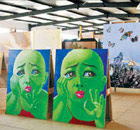-
-
China Daily E-paper
Zhu Yuan
Are we still culturally old and racially young?
By Zhu Yuan (China Daily)
Updated: 2009-12-30 07:36
 |
Large Medium Small |
Interacting with people of a country is perhaps the best way to know them. But we can also do so by reading about them - not just about their history or politics, but also about the way they lead their lives and the ties they share with their relatives and friends. The Chinese people are no exception to this rule.
Chinese scholar and novelist Lin Yutang (1895-1976) writes in My Country and My People: "Among the cultural forces making for racial stability must be counted first of all the Chinese family system, which was so well-refined and organized as to make it impossible for a man to forget where his linage belonged." Reading about the family lives of Chinese will enable a foreigner to have deep insight into the stamina and vitality of this old civilization.
Renowned novelist Hong Ying's most recent fictional autobiography, Good Children of the Flowers, could be one of the best books to know about the twists and turns between a Chinese mother and her children. It is also about the unselfish maternal love that has never been abused and about the children's lack of understanding for such love. By the time they understand what maternal love is it's too late - because she is already dead.
A Chinese poem compares such love to a thread that a mother uses to sew clothes for her children. Her concern for her children is just like that thread, which can be severed neither by time nor space. No matter how long and how far her children have been away, her love and concern for them never diminishes.
This is beautifully expressed in Good Children of the Flowers. Hong Ying's mother never expressed her concern for her daughter explicitly because she knew that too much outward expression of love was tantamount to abusing it and could become a burden for Hong. But she talked about Hong with friends and carefully clipped her every report. She missed Hong Ying no end. But every time Hong called to say that she would try to spare some time for a trip back home to meet her, she would insist that Hong did her job well and a phone call was enough for her to know that she had a place for her in her heart.
Lin Yutang says in My Country and My People: "A distinction may be made by saying that the Chinese are culturally old but racially young." He also says: "Perhaps, 'a prolonged childhood' is the better term, for infantilism and arrested development or stagnation are misleading terms."
I may be a bit biased, I am afraid, if I say that the special concern that most Chinese mothers have for their children can be explained as a characteristic that Lin Yutang describes as Chinese people's immaturity as a race.
If my impression is right, the kinship in Chinese families is closer than their counterparts in the West. At least, that is the case with my father's and my generations.
What is noteworthy, however, in Hong Ying's novel is that Chinese youths are not as much attached to their parents as their older generations were to theirs. Hong Ying says in her novel that she never thought of sharing with her mother the suffering and frustrations of living with her former husband until it was too late.
The current one-child policy, globalization and the self-centric nature of Western culture are having an impact on China's younger generations. Will they make the Chinese a more mature race? Read Hong Ying's novel and if you like, My Country and My People, to get the answer yourself.
E-mail: zhuyuan@chinadaily.com.cn
(China Daily 12/30/2009 page8)









